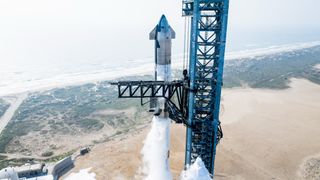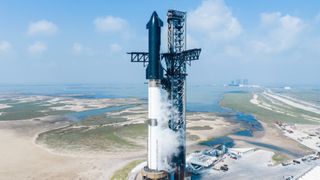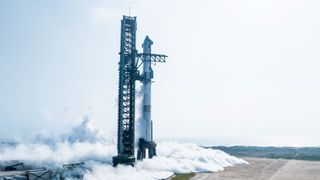The "wet dress rehearsal" apparently went well.

SpaceX just fueled up its giant Starship rocket, checking another box ahead of the vehicle's fourth test flight.
The company performed a "wet dress rehearsal" with Starship at its Starbase site in South Texas today (May 20), filling both of the vehicle's stages with supercold liquid oxygen and liquid methane in a key prelaunch test.
"Launch rehearsal for Flight 4 complete," SpaceX said in a post on X today, which also shared four photos of the procedure.

Starship's Super Heavy first stage gets frosty white thanks to the flow of supercold propellants during a fueling test on May 20, 2024. (Image credit: SpaceX via X)
SpaceX is developing Starship to help humanity settle the moon and Mars, among other ambitious tasks. And the company already has customers lined up. A few years ago, for instance, NASA selected Starship as the first crewed lander for its Artemis program of lunar exploration.
The vehicle consists of two stainless-steel stages, both of which are designed to be fully reusable: a huge booster called Super Heavy and a 165-foot-tall (50 meters) spacecraft known as Starship, or simply "Ship."
When these two stages are stacked, Starship stands about 400 feet (122 meters) tall — higher than any rocket ever built. It's also the most powerful launcher in history, boasting about 16.7 million pounds of thrust at liftoff. That's nearly twice as much thrust as NASA's Space Launch System moon rocket.
That thrust comes courtesy of Super Heavy's 33 Raptor engines. Ship, for its part, is powered by six Raptors. The engines burn liquid oxygen and liquid methane, propellants that can be sourced on Mars, SpaceX founder and CEO Elon Musk has stressed.

SpaceX aims to launch Starship again in early June. (Image credit: SpaceX via X)
Starship has flown three times to date, in April 2023, November 2023 and March 14 of this year.
The debut flight didn't last long; Starship's two stages failed to separate, and SpaceX detonated the vehicle intentionally four minutes after launch. Starship achieved stage separation on flight two, which lasted twice as long. Flight three was even better, coming to an end about 50 minutes after liftoff when Ship broke apart upon reentry to Earth's atmosphere.
The main goal of the upcoming flight four "is getting through max reentry heating," Musk said via X today.
SpaceX aims to launch flight four in about two weeks, he added in the X post. However, the timing may not be entirely up to the company.
SpaceX has applied for a Starship launch license modification from the U.S. Federal Aviation Administration (FAA), for example, a request that is apparently still pending. The FAA is also overseeing an investigation into what happened on Starship's third flight.


 Optimisus
Optimisus CryptoPotato_News
CryptoPotato_News DogeHome
DogeHome BlockchainReporter
BlockchainReporter Optimisus
Optimisus TheCoinrise Media
TheCoinrise Media Optimisus
Optimisus






















